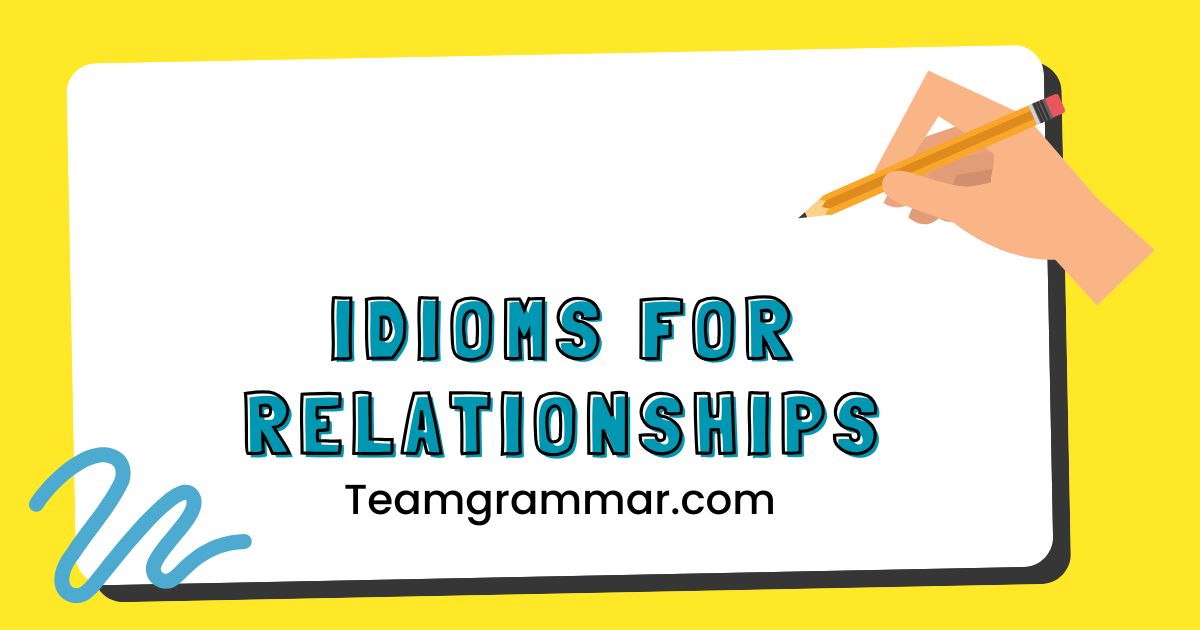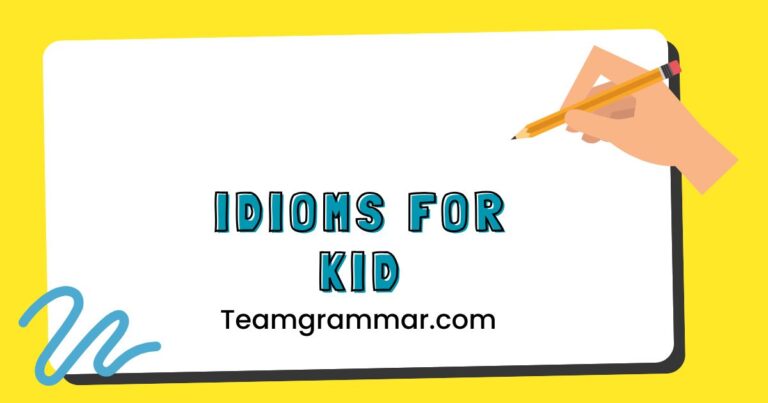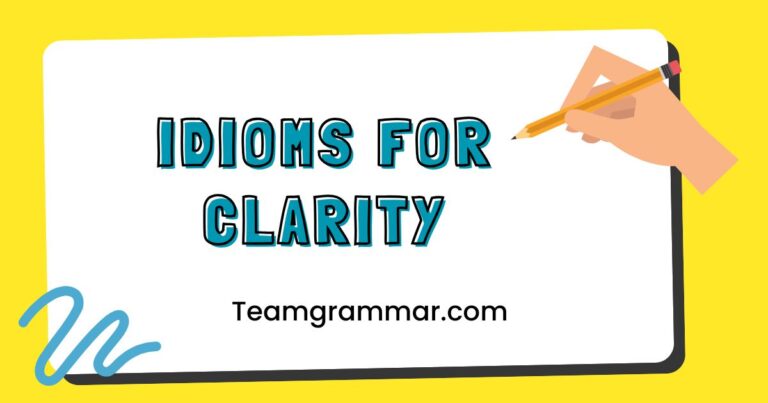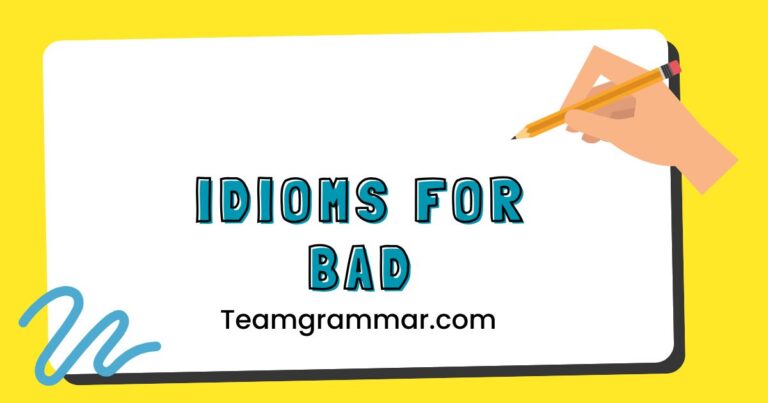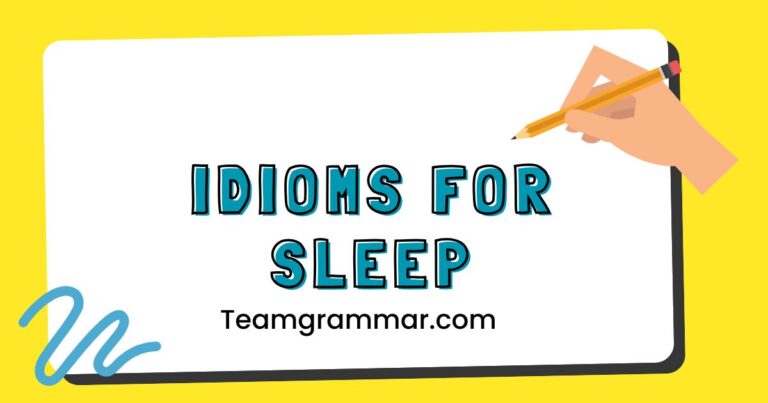33 Idioms for Relationships: A Comprehensive Guide
Understanding idioms is crucial for mastering the nuances of the English language, particularly when discussing relationships. Idioms add color and depth to conversations, allowing speakers to convey complex emotions and situations with vivid imagery.
This guide provides a comprehensive exploration of idioms related to relationships, enhancing your comprehension and expression. Whether you’re an English language learner or a native speaker aiming to refine your communication skills, this article offers valuable insights and practical examples.
Table of Contents
- Introduction
- Definition of Idioms for Relationships
- Structural Breakdown
- Types and Categories of Relationship Idioms
- Examples of Relationship Idioms
- Usage Rules for Relationship Idioms
- Common Mistakes with Relationship Idioms
- Practice Exercises
- Advanced Topics: Nuances and Context
- Frequently Asked Questions
- Conclusion
Definition of Idioms for Relationships
An idiom is a phrase or expression whose meaning cannot be understood from the literal meanings of the individual words. Instead, it has a figurative meaning known through common usage.
Relationship idioms are specific phrases that describe different aspects, stages, or qualities of interpersonal relationships, including romantic, familial, and platonic connections.
These idioms serve as a shorthand for expressing complex emotions, situations, and dynamics within relationships. They add color and depth to communication, allowing speakers to convey nuanced meanings in a concise and engaging manner.
Understanding relationship idioms is essential for comprehending everyday conversations, literature, movies, and other forms of media.
Relationship idioms can be classified based on the type of relationship they describe (e.g., romantic, familial) or the aspect of the relationship they address (e.g., falling in love, experiencing conflict, ending a relationship). They function as descriptive tools, emotional amplifiers, and cultural markers within the English language.
Structural Breakdown
The structure of relationship idioms varies widely, but they generally consist of a combination of nouns, verbs, adjectives, and prepositions arranged in a specific order. The meaning of the idiom is not derived from the grammatical function of each word but rather from the collective understanding of the phrase as a single unit.
Many relationship idioms utilize metaphors and similes to draw comparisons between relationships and other concepts. For example, “to be on the rocks” uses the image of a ship hitting rocks to describe a relationship facing serious problems.
The effectiveness of an idiom lies in its ability to evoke a vivid image or association that resonates with listeners or readers.
Idioms often have a fixed structure and cannot be easily altered without losing their intended meaning. While some idioms allow for slight variations (e.g., “fall head over heels” vs.
“fall head over heels in love”), most require precise wording to maintain their idiomatic force. This rigidity contributes to the challenge of mastering idioms, as learners must memorize the specific phrases and their associated meanings.
Types and Categories of Relationship Idioms
Relationship idioms can be categorized based on the specific aspect of relationships they describe. This section breaks down these idioms into several key categories, providing a structured overview of their diverse meanings and usages.
Idioms About Falling in Love
This category includes idioms that describe the initial stages of a romantic relationship, the feeling of attraction, and the development of strong affection. These idioms often convey a sense of excitement, infatuation, and vulnerability.
Idioms About Relationship Strength
These idioms characterize the stability, resilience, and commitment within a relationship. They often highlight qualities such as trust, understanding, and mutual support.
These idioms are essential for describing healthy and enduring connections.
Idioms About Relationship Problems
This category encompasses idioms that describe conflicts, disagreements, and difficulties encountered in relationships. They often convey a sense of tension, frustration, and uncertainty.
Understanding these idioms is crucial for discussing relationship challenges in a sensitive and nuanced manner.
Idioms About Ending Relationships
These idioms describe the dissolution of a relationship, whether through separation, divorce, or a gradual drifting apart. They often convey a sense of sadness, loss, and closure.
These idioms provide a way to discuss the sensitive topic of breakups with empathy and understanding.
General Relationship Idioms
This category includes idioms that describe relationships in a broader sense, without focusing on a specific stage or aspect. They often convey general observations about the nature of relationships, the roles people play, and the dynamics involved.
Examples of Relationship Idioms
This section provides extensive examples of relationship idioms, organized by category. Each example is accompanied by a definition and a sample sentence to illustrate its meaning and usage.
Falling in Love Examples
The table below showcases idioms related to falling in love, their meanings, and example sentences demonstrating their use in context.
| Idiom | Meaning | Example Sentence |
|---|---|---|
| Head over heels | Deeply and madly in love | She fell head over heels for him the moment they met. |
| Love at first sight | Falling in love immediately upon meeting someone | They experienced love at first sight and got married within a year. |
| Have a crush on | To have a brief but intense infatuation | He has a crush on his classmate, but he’s too shy to talk to her. |
| Carry a torch for | To continue to be in love with someone who is not available | Even after all these years, he still carries a torch for his high school sweetheart. |
| Swept off one’s feet | To be overwhelmed by romantic feelings | She was swept off her feet by his charm and generosity. |
| Googly-eyed | Looking at someone with adoration | He gets all googly-eyed whenever she walks into the room. |
| Smitten with | Suddenly and powerfully attracted to someone | From the moment he met her, he was completely smitten with her wit and charm. |
| Hit it off | To immediately get along well with someone | We hit it off immediately and talked for hours on our first date. |
| Click with | To quickly form a connection with someone | They clicked with each other right away and became best friends. |
| Have eyes only for | To be attracted to only one person | He has eyes only for her, even though many other women are interested in him. |
| Be an item | To be in a romantic relationship | Everyone knew they were an item when they started holding hands everywhere. |
| A match made in heaven | A relationship that seems perfect | Their friends said they were a match made in heaven because they complemented each other so well. |
| Tie the knot | To get married | They decided to tie the knot after dating for five years. |
| Pop the question | To propose marriage | He planned to pop the question during their romantic vacation. |
| Take the plunge | To get married (often implying some hesitation) | After years of dating, they finally decided to take the plunge. |
| Seal the deal | To finalize a romantic commitment, often through marriage | They decided to seal the deal with a beautiful wedding ceremony. |
| Fall for someone | To begin to love someone | I started to fall for her after spending more time together. |
| Light someone’s fire | To excite or inspire someone romantically | Her passion and intelligence really lighted his fire. |
| Win someone over | To gain someone’s affection or approval | He worked hard to win her over, and eventually, she fell in love with him. |
| Strike up a relationship | To start a romantic relationship | They struck up a relationship after meeting at a conference. |
| Get hitched | To get married (informal) | They decided to get hitched in a small, private ceremony. |
| Head over heels in debt | Deeply involved in a difficult situation (humorous twist) | He fell head over heels in debt after planning an extravagant wedding. |
Relationship Strength Examples
The table below illustrates idioms that describe the strength and stability of relationships, along with their meanings and example sentences.
| Idiom | Meaning | Example Sentence |
|---|---|---|
| Thick and thin | Through good times and bad times | They’ve been together through thick and thin, always supporting each other. |
| A shoulder to cry on | Someone who offers comfort and support | She’s always been a shoulder to cry on for her friends. |
| Two peas in a pod | Two people who are very similar and get along well | They’re like two peas in a pod, always doing everything together. |
| Joined at the hip | Inseparable; very close | They’ve been joined at the hip since they were kids. |
| A bond that can’t be broken | A very strong and unbreakable connection | Their friendship is a bond that can’t be broken, no matter what happens. |
| Get along like a house on fire | To have a very good and harmonious relationship | They get along like a house on fire, laughing and joking all the time. |
| See eye to eye | To agree completely | They see eye to eye on most issues, which makes their relationship easy. |
| Stand by someone | To support someone during difficult times | I will always stand by my family, no matter what. |
| Be there for someone | To be available to support and help someone | I know I can always be there for my friends when they need me. |
| Have each other’s back | To support and protect each other | They always have each other’s back in tough situations. |
| Like two magnets | To be irresistibly drawn to each other | They are like two magnets, always finding their way back to each other. |
| A pillar of strength | Someone who provides unwavering support | She has been a pillar of strength for her family during the crisis. |
| An anchor in a storm | Someone who provides stability during difficult times | He has been an anchor in a storm for me throughout my struggles. |
| A rock | Someone who is reliable and steadfast | She is my rock, always there to support me. |
| Soulmates | Two people who are perfectly suited for each other | They believe they are soulmates, destined to be together. |
| A perfect fit | Two people who complement each other well | They are a perfect fit, understanding each other’s needs and desires. |
| A partnership | A balanced and supportive relationship | Their marriage is a true partnership, with both contributing equally. |
| A united front | Presenting a unified and strong appearance | As parents, they always present a united front, even when they disagree privately. |
| In sync | Being in harmony and agreement | They are always in sync, intuitively understanding each other. |
| On the same wavelength | Having similar thoughts and feelings | They are always on the same wavelength, which makes communication easy. |
| A true friend | Someone who is loyal and supportive | He is a true friend, always there to help in need. |
| A ride or die | Extremely loyal and supportive, no matter what | She’s my ride or die; I know I can always count on her. |
Relationship Problems Examples
This table presents idioms that describe problems and conflicts within relationships, along with their meanings and example sentences.
| Idiom | Meaning | Example Sentence |
|---|---|---|
| On the rocks | Experiencing difficulties and likely to fail | Their marriage has been on the rocks for months, and they’re considering divorce. |
| Hit a rough patch | To experience a difficult period | Every couple hits a rough patch eventually, but it’s important to work through it. |
| At each other’s throats | Constantly arguing and fighting | They’ve been at each other’s throats lately, making everyone uncomfortable. |
| Drive someone up the wall | To irritate or annoy someone greatly | His constant complaining is driving me up the wall. |
| Get on someone’s nerves | To irritate or annoy someone | Her constant humming is starting to get on my nerves. |
| Wear thin | To lose patience or tolerance | My patience is starting to wear thin with his constant excuses. |
| Blow up | To have a sudden and angry outburst | They blew up at each other after a minor disagreement. |
| Let off steam | To release pent-up anger or frustration | He goes to the gym to let off steam after a stressful day. |
| Air dirty laundry | To publicly discuss private or embarrassing matters | They shouldn’t air their dirty laundry in front of the children. |
| Sweep under the rug | To ignore or hide a problem | They tend to sweep their problems under the rug instead of addressing them. |
| A bone of contention | A subject of disagreement | Money has always been a bone of contention in their relationship. |
| Walk on eggshells | To be very careful not to offend someone | I feel like I have to walk on eggshells around him because he’s so sensitive. |
| Give someone the cold shoulder | To deliberately ignore someone | She’s been giving me the cold shoulder ever since our argument. |
| Call it quits | To end a relationship or agreement | They decided to call it quits after years of unhappiness. |
| Go separate ways | To end a relationship and live different lives | After college, they decided to go their separate ways. |
| Cook up a storm | To create a lot of trouble or conflict (often humorous) | Her meddling in family affairs always cooks up a storm. |
| Worlds apart | Having very different opinions or lifestyles | They realized they were worlds apart and couldn’t make the relationship work. |
| Come to blows | To have a physical fight | Their argument nearly came to blows before friends intervened. |
| Rub someone the wrong way | To irritate or annoy someone unintentionally | His sarcastic remarks always rub her the wrong way. |
| Be at loggerheads | To be in strong disagreement | They are constantly at loggerheads over political issues. |
| On the outs | To be temporarily not on good terms | They’ve been on the outs since their disagreement last week. |
| A thorn in one’s side | A persistent source of annoyance or trouble | His constant criticism is a thorn in my side. |
Ending Relationships Examples
The following table provides idioms related to the ending of relationships, including their meanings and example sentences.
| Idiom | Meaning | Example Sentence |
|---|---|---|
| Break up | To end a romantic relationship | They decided to break up after realizing they wanted different things. |
| Split up | To end a romantic relationship (similar to “break up”) | They split up amicably and remained friends. |
| Call it off | To cancel or terminate something, such as a wedding or engagement | They had to call off the wedding due to unforeseen circumstances. |
| Leave someone at the altar | To not show up for a wedding | He left her at the altar, leaving her heartbroken and humiliated. |
| Dump someone | To end a romantic relationship abruptly | She dumped him because he was always late. |
| Get dumped | To be the person who is broken up with | He got dumped after his girlfriend found out he was lying. |
| Kick someone to the curb | To reject or dismiss someone harshly | She kicked him to the curb when she found out he was cheating. |
| Go their separate ways | To end a relationship and live different lives | After college, they decided to go their separate ways. |
| Drift apart | To gradually become less close | Over the years, they drifted apart and eventually lost contact. |
| Outgrow each other | To develop different interests and values, leading to a separation | They realized they had outgrown each other and decided to end the relationship. |
| Part ways | To end a relationship or partnership | They decided to part ways after many years of working together. |
| Cut ties | To end a relationship or connection completely | She decided to cut ties with her toxic friends. |
| Wash your hands of | To disclaim responsibility for someone or something | He washed his hands of the project after realizing it was failing. |
| Close the door | To end a chapter or relationship | She closed the door on her past and moved forward. |
| Move on | To recover from a loss or disappointment and start a new chapter | It’s important to move on after a breakup and focus on yourself. |
| Start a new chapter | To begin a new phase in life after a significant change | After the divorce, she decided to start a new chapter in a different city. |
| Go cold turkey | To abruptly stop a habit or relationship | He went cold turkey on their relationship after she betrayed him. |
| Turn the page | To start a new phase after ending something | It’s time to turn the page and focus on the future. |
| Say goodbye | To bid farewell and end a relationship | It was hard to say goodbye, but they knew it was the right decision. |
| Fade away | To gradually disappear or diminish | Their love eventually faded away due to distance and lack of communication. |
General Relationship Examples
The table below presents idioms that describe relationships in general, without focusing on a specific stage or issue, along with their meanings and example sentences.
| Idiom | Meaning | Example Sentence |
|---|---|---|
| Get to first base | To make initial progress in a romantic relationship | He was excited that he finally got to first base on their date. |
| Blind date | A date with someone you’ve never met before | She went on a blind date set up by her friend. |
| Double date | A date with two couples | They went on a double date with their best friends. |
| Puppy love | Intense but often temporary infatuation, especially in young people | Their relationship was just puppy love and didn’t last very long. |
| Lovey-dovey | Excessively affectionate and sentimental | They were being very lovey-dovey, holding hands and gazing into each other’s eyes. |
| Tie the knot | To get married | They decided to tie the knot after dating for five years. |
| Settling down | To establish a stable and committed relationship | They are ready to settle down and start a family. |
| An old flame | A former lover | He ran into an old flame at the grocery store. |
| A love triangle | A situation where three people are involved in romantic relationships | The movie tells the story of a complicated love triangle. |
| The honeymoon phase | The initial period of a relationship when everything seems perfect | They are still in the honeymoon phase, so everything is wonderful. |
| A fair-weather friend | Someone who is only there for you when things are good | He turned out to be a fair-weather friend and disappeared when I needed help. |
| A friend in need is a friend indeed | A true friend is someone who helps you when you are in trouble | He proved that a friend in need is a friend indeed by helping me move. |
| Keep someone at arm’s length | To avoid becoming too close to someone | She tends to keep people at arm’s length because she’s afraid of getting hurt. |
| A social butterfly | Someone who is very sociable and enjoys attending parties | She’s such a social butterfly and knows everyone in town. |
| Birds of a feather flock together | People who are similar tend to associate with each other | They became friends because birds of a feather flock together. |
| See eye to eye | To agree with someone | They don’t always see eye to eye, but they respect each other’s opinions. |
| Turn a blind eye | To ignore something that you know is wrong | The boss turned a blind eye to the employee’s misconduct. |
| Bury the hatchet | To make peace after a disagreement | They decided to bury the hatchet and become friends again. |
| A leopard can’t change its spots | People cannot change their fundamental nature | He always breaks promises because a leopard can’t change its spots. |
| Keep up with the Joneses | To try to match the lifestyle and possessions of one’s neighbors | They are always trying to keep up with the Joneses by buying the latest gadgets. |
| Make amends | To do something to correct a mistake or wrong | He wanted to make amends for his past behavior. |
Usage Rules for Relationship Idioms
Using relationship idioms correctly requires understanding their specific meanings and contexts. While idioms add color and depth to communication, using them inappropriately can lead to confusion or misinterpretation.
Here are some key rules to follow:
- Context Matters: Always consider the context of the conversation or writing. An idiom that is appropriate in one situation may be unsuitable in another. For example, using “call it quits” in a formal business setting might be inappropriate.
- Audience Awareness: Be mindful of your audience’s familiarity with English idioms. If you are speaking to non-native speakers or individuals with limited English proficiency, it’s best to avoid using complex or obscure idioms.
- Literal vs. Figurative: Remember that idioms have a figurative meaning that differs from the literal meanings of the individual words. Avoid interpreting idioms literally, as this will often lead to misunderstanding.
- Fixed Structure: Most idioms have a fixed structure and cannot be easily altered. Avoid changing the wording or grammatical structure of an idiom, as this may render it meaningless or incorrect.
- Appropriate Tone: Choose idioms that align with the tone and style of your communication. Some idioms are informal and conversational, while others are more formal and literary.
- Cultural Sensitivity: Be aware that some idioms may have cultural connotations or associations that could be offensive or inappropriate in certain contexts.
Mastering the usage of relationship idioms requires practice and exposure to a wide range of English language materials. Pay attention to how native speakers use idioms in conversations, movies, books, and other forms of media.
Over time, you will develop a better understanding of their meanings, contexts, and appropriate usages.
Common Mistakes with Relationship Idioms
Many learners make common mistakes when using relationship idioms. Understanding these errors can help you avoid them and improve your fluency.
Here are some frequent mistakes and how to correct them:
| Incorrect | Correct | Explanation |
|---|---|---|
| They are in the rocks. | They are on the rocks. | The correct idiom is “on the rocks,” not “in the rocks.” |
| She has a crush with him. | She has a crush on him. | The correct preposition is “on,” not “with.” |
| They see eye to eye each other. | They see eye to eye. | The phrase “each other” is unnecessary and incorrect in this idiom. |
| He gave her a cold shoulder on the party. | He gave her the cold shoulder at the party. | The correct article is “the,” and the preposition should be “at.” |
| They broke out. | They broke up. | “Broke up” is the correct idiom for ending a relationship. |
| She dumped out him. | She dumped him. | The preposition “out” is unnecessary and incorrect in this idiom. |
| They called off their relationship. | They called it off. | “It” refers to the wedding or engagement, not the entire relationship. |
| They are like two peas from a pod. | They are like two peas in a pod. | The correct preposition is “in,” not “from.” |
| He sweeps the problem under the carpet. | He sweeps the problem under the rug. | The correct word is “rug,” not “carpet.” |
| They are thick and thin together. | They are together through thick and thin. | The correct phrase is “through thick and thin.” |
Practice Exercises
These exercises will help you practice using relationship idioms correctly. Each exercise focuses on a different aspect of idiom usage, providing a well-rounded learning experience.
Exercise 1: Fill in the Blanks
Complete the following sentences with the appropriate relationship idiom from the list below.
Idioms: head over heels, on the rocks, a shoulder to cry on, two peas in a pod, call it quits
| Question | Answer |
|---|---|
| 1. After years of struggling, they decided to __________. | call it quits |
| 2. She’s always been __________ for her friends when they’re going through a tough time. | a shoulder to cry on |
| 3. Their marriage has been __________ for months, and they’re considering divorce. | on the rocks |
| 4. They’re like __________, always doing everything together. | two peas in a pod |
| 5. He fell __________ for her the moment they met. | head over heels |
| 6. After the argument, their friendship was ______. | on the rocks |
| 7. She was so upset, she needed __________ to help her through it. | a shoulder to cry on |
| 8. They were so similar, everyone said they were __________. | two peas in a pod |
| 9. When he lost his job, he felt like their relationship was __________. | on the rocks |
| 10. Despite their best efforts, they had to __________ and move on. | call it quits |
Exercise 2: Matching
Match the idiom with its correct meaning.
| Idiom | Meaning |
Match |
|---|---|---|
| 1. Hit it off | A. To end a relationship | |
| 2. Call it quits | B. To be very similar | |
| 3. Joined at the hip | C. To get along immediately | |
| 4. See eye to eye | D. To be inseparable | |
| 5. Two peas in a pod | E. To agree completely |
Answers: 1-C, 2-A, 3-D, 4-E, 5-B
Exercise 3: Sentence Completion
Complete the sentences using the appropriate form of the idiom provided.
Idioms: drive up the wall, get on someone’s nerves, walk on eggshells
| Question | Answer |
|---|---|
| 1. His constant humming is starting to really __________ . | get on my nerves |
| 2. I feel like I have to __________ around her because she’s so sensitive. | walk on eggshells |
| 3. Her constant complaining is __________ . | driving me up the wall |
| 4. Living with a messy roommate can really __________ . | drive you up the wall |
| 5. It’s exhausting to always __________ to avoid upsetting him. | walk on eggshells |
Advanced Topics: Nuances and Context
Mastering relationship idioms involves understanding their subtle nuances and the contexts in which they are most appropriately used. The same idiom can convey different meanings or have varying levels of intensity depending on the situation and the speaker’s intent.
- Regional Variations: Be aware that some idioms may be more common or have slightly different meanings in different regions or dialects of English. For example, an idiom used frequently in American English may be less familiar or have a different connotation in British English.
- Historical Context: Some idioms have historical origins that can shed light on their meanings and usages. Understanding the historical context of an idiom can enhance your appreciation of its cultural significance and expressive power.
- Emotional Intensity: Consider the emotional intensity of an idiom when choosing it for a particular situation. Some idioms are mild and understated, while others are strong and dramatic. Choose an idiom that accurately reflects the emotional tone you wish to convey.
- Informal vs. Formal Usage: Distinguish between idioms that are appropriate for informal, conversational settings and those that are better suited for formal, written communication. Avoid using slangy or colloquial idioms in formal contexts.
- Creative Adaptation: While most idioms have a fixed structure, some can be creatively adapted or combined to create new expressions. However, use caution when adapting idioms, as it’s easy to create nonsensical or confusing phrases.
By delving deeper into the nuances and contexts of relationship idioms, you can develop a more sophisticated understanding of their expressive potential and use them with greater confidence and accuracy.
Frequently Asked Questions
Conclusion
Relationship idioms are a vibrant and essential part of the English language, offering a colorful and nuanced way to describe the complexities of human connections. By understanding the definitions, structures, and usage rules of these idioms, you can enhance your communication skills and express yourself with greater precision and flair.
Throughout this guide, we have explored various categories of relationship idioms, provided numerous examples, and offered practical exercises to reinforce your learning. We have also addressed common mistakes and advanced topics to help you master the subtleties of idiom usage.
As you continue your journey of learning and mastering relationship idioms, remember to practice regularly, pay attention to context, and embrace the richness and diversity of the English language. With dedication and perseverance, you can unlock the full expressive potential of these fascinating phrases and communicate with greater confidence and effectiveness in all your relationships.

